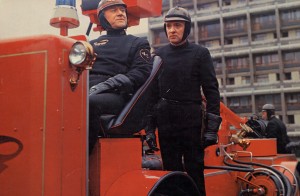Ray Bradbury died this Tuesday. Frye mentions Bradbury in the entry on “Satire” in the Harper Handbook:
Perhaps the most concentrated form of fantasy is the presentation of the imaginary ideal state known as the UTOPIA, where all activity is ritualized and where every individual fits perfectly into the social mould. And perhaps the most concentrated form of satire is what is now called the DYSTOPIA, the Utopian parody of a world turned by malice or cunning into a nightmarish hell, as in Orwell’s Nineteen Eighty-Four, Yevgeny Zamyatyn’s We, or Aldous Huxley’s Brave New World and Ape and Essence. A good deal of SCIENCE FICTION is based on dystopian allegories (for example Ray Bradbury’s Fahrenheit 451 and Walter M. Miller’s A Canticle for Leibowitz), where the relation to the social pitfalls in contemporary technology is close enough for frightening plausibility in the fantasy. (CW 18, 384)
Bob Denham has directed me to two other references, from the volume he edited, Northrop Frye: Selected Letters, 1934–1991. Here is the first, a letter to Ray Bradbury in Los Angeles, dated 31 March 1969.
Frye and Bradbury had been seated together at some unidentified faculty dinner. Bradbury asked Frye for two of his books, which Frye mailed to him. Bradbury wrote on 16 March 1969, thanking Frye for the books and saying that he hoped they could “meet again some day under quieter auspices, and not have to discuss the pros and cons of such 1968 vaudeville miseries as HAIR.” With his letter, Bradbury sent Frye several of his own books, prompting the present reply.
Dear Mr. Bradbury,
I am just taking off for your part of the world again, but your books have just arrived and I did want to thank you for them. I am quite familiar enough with your work to know that the statement quoted from Isherwood in one of the introductions, that yours is a very great and unusual talent, is a simple factual statement. (130)
As Bob points out in his explanatory notes, “These were doubtless the following two presentation copies in Frye’s library: The Martian Chronicles, with a new introduction by Fred Hoyle (New York: Time, 1963), and The Vintage Bradbury: Ray Bradbury’s Own Selection of His Best Stories, with an introduction by Gilbert Highet (New York: Vintage Books, 1965).” As to the Isherwood reference: “In a 1950 review of The Martian Chronicles, Christopher Isherwood observed, ‘Mr. Bradbury is a very great and unusual talent.'”
Then there is the following, a letter to the biologist David W. Ehrenfeld, Barnard College, Columbia University, dated 15 January 1974:
In reply to Ehrenfeld’s query (28 December 1973): why is Spengler not juxtaposed more often in the critical literature with Roderick Seidenberg? Ehrenfeld reports that he had just read Frye’s essay on Spengler, “The Decline of the West by Oswald Spengler”( Dædalus, 103 [Winter 1974]: 1–13), which he found to be reminiscent of Orwell’s critical style.
Dear Mr. Ehrenfeld:
Thank you very much for your letter. I am glad if I was like Orwell, who seems to me an admirable stylist, but he is impossible to imitate, because his lucidity is a direct product of his moral integrity.
I cannot say that I know Seidenberg’s book well enough to answer your questions properly. From what I can gather of him, I should say that you have answered them yourself pretty accurately. I don’t know why he isn’t mentioned more often: I suppose one thing is the difference in date. Seidenberg seems to me to be predominantly a writer reflecting the age of science fiction as an extremely important and central cultural development. But the kind of questioning of cultural values which he embodies seems very like the kind of thing one keeps running into in Clarke, Bradbury, Ballard, and others. In general, I am inclined to feel that Seidenberg’s thesis is really a more superficial and simplified version of Spengler’s, as you yourself strongly hint. (163)
I wish you the best of luck in your own reflections on the subject.
The reference is to “Post‑historic Man (New York: Viking, 1950). Seidenberg argued that the human race was being trapped into moral immobility by rational mechanisms aimed at organizing and thus controlling the natural and human world,” and Ehrenfeld believes that Seidenberg “has posed a plausible and direct challenge to Spengler’s view of history.”


Thanks for going to the trouble of laying out this interesting intersection of these two figures.
FRYE, BRADBURY & INCARNATE MEANING !!!
A story I can’t get out of my head, every time I come across the
name Ray Bradbury:
John Heuston engaged Bradbury to write the film script for
MOBY DICK. The Director, actors and script writer stayed in
the same hotel and met regularly for meals. Every chance he
could get, Heuston would declare, “Well, Ray,how is it going!?”
Bradbury’s only answer was–“nothing!” He spent months reading
and rereading the book, until one morning he looked in the
mirror and shouted, “I’m Herman Melvill!!!” He finished the script in three weeks.
Is this part of what Frye means by “ecestatic metaphor”?
NWG